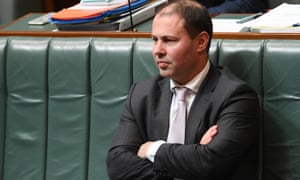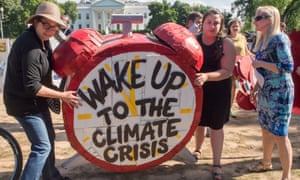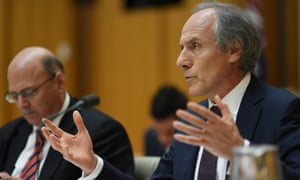Extract from The Guardian
The
prime minister has to prove his mettle by pushing through a climate
and energy policy – despite party room sniping – that Labor will
support
Protesters
demonstrate in front of the White House after the US president,
Donald Trump, announced his decision to withdraw from the Paris
climate accord. Photograph: Paul J. Richards/AFP/Getty Images
Contact
author
Friday
2 June 2017 12.11 AEST Last modified on Friday 2 June
2017 12.13 AEST
People
who have been following Australia’s tortured climate change policy
debate for a long time could be forgiven for wondering whether the
whole area is cursed.
Just
when it looks like there could be a prospect of progress, an obstacle
emerges. In this case, the obstacle is Donald Trump, who
by withdrawing from the Paris climate accord has turned
America from leader of the free world into free rider.
The
US president’s willingness to surrender global leadership on
important issues is, from this distance, truly unfathomable. Even his
withdrawal patter on Friday morning was pathetic. America was out,
but would come back in if it could get a better deal. America was
out, but possibly back in, because the citizens of Pittsburgh
apparently don’t care about climate change.
Seriously.
What a performance. As Malcolm
Turnbull might have said breezily before he almost lost an
election, what a time to be alive.
I
know there’s a valid school of thought that says silly Trump
doesn’t matter, that America’s recklessness will galvanise the
public around the importance of climate change, that the trend
towards decarbonisation is now hard-baked in to the system –
but that’s not how things look if you sit on the Australian
government’s perch.
For
Turnbull and his government, Trump’s timing is deeply unhelpful, to
put it mildly. Right now it is trying to land its own energy policy
plane, and whenever you put climate and the Coalition in
the same sentence, you know things are going to get complicated.
This
week the government announced it would change
the rules governing the Clean Energy Finance Corporation to
allow investments in carbon capture and storage – to make the
government’s so-called “green bank” more technology-neutral in
its outlook.
This
rule change was in large part about laying some groundwork for a more
substantial process which is lurking, just visible over the horizon.
A week from now, a much anticipated report from the chief scientist,
Alan Finkel, will be made public.
The
chief scientist, Alan Finkel, at Senate estimates on 1 June.
Photograph: Lukas Coch/AAP
For
months, Finkel has been beavering away trying to save the government
from the significant problem it created for itself when it decided,
after an internal rebellion, to
rule out a carbon trading scheme for the electricity sector.
He
has been trying to come up with alternative options which would give
the market a clear signal to kickstart new investment in generation
capacity – with an eye to Australia’s emissions reduction
commitments. This is no easy brief, particularly with one arm tied
behind your back.
The
word around the major interest groups says Finkel will maintain
his preliminary
advice that an emissions intensity scheme would be a good
option, but he will also recommend the government consider a low
emissions target, which in practice works like a technology-neutral
renewable energy target.
A low
emissions target is a regulation requiring that a percentage of
electricity be generated annually from “low-emissions” sources.
This will certainly be renewables and gas. It could even be high
efficiency coal if you were (1) a government wanting to placate
Australia’s resources sector (which is already warming its jets for
“axe the carbon tax” round two), and (2) a government needing to
apply a stun gun to climate sceptics inside your own party room.
Including
coal in a low emissions target would be a completely ludicrous
development, but ludicrous is what you get after 10 years of zero
sum, win-at-all-costs, peak stupid politics.
If
you engage in the sort of destructive political madness the Coalition
has engaged in over the past decade, you unfortunately get to be the
hostage of your dancing partners, both internal and external –
unless you develop the guts to stand up and tell them to get stuffed.
Steering
a low emissions target through a party room which contains a rump of
climate sceptics, who are already campaigning full tilt to get rid of
the current renewable energy target, isn’t even the hard part.The
really tricky bit will come after that.
A low
emissions target isn’t a silver bullet that will magically make
Australia meet its Paris emissions reduction targets, particularly if
the target isn’t ambitious.
Additional
abatement measures will be required on top to meet the current Paris
commitments, and there will be internal fights about what those
measures should be, and their impact on power prices.
It
doesn’t take much imagination to envisage a scenario where
government conservatives would argue that one foolproof way for
Australia to get out of its Paris “problem” would be to get out
of Paris, or substantially lower the level of ambition, using the US
exit as justification.
A
bunch of people inside the government are already saying this – some
have been saying it from the moment Trump was elected –
and I believe most of them mean it. You don’t have to ask me how
dangerous these discussions get in the Coalition. We can just ask
Turnbull, who lost the party leadership over the issue back in 2009.

The
energy minister, Josh Frydenberg, backs Malcolm Turnbull’s
determination that Australia will not withdraw from the Paris accord.
Photograph: Lukas Coch/AAP
To
their credit, Turnbull and the energy minister, Josh
Frydenberg, are absolutely holding the line. Turnbull pushed
through the Paris ratification five minutes after Trump was elected,
and both say Australia will not withdraw from the accord.
Frydenberg
is also trying to thread the needle on Finkel. He’s mapped out a
route through the obstacle course, strapped on his crash helmet, and
set off at a steady jog.
But
again, it’s not just the Coalition’s tortured internals the prime
minister and the energy minister have to war game about. The
government also has to think about how its reworked energy policy
might ultimately attract bipartisan support.
This
might seem a laughable concept given all the toxic sludge that’s
gone under the bridge this past decade, but the problem the
government faces in a public policy sense – a demonstrably sub-par
energy grid – can’t be solved unless industry finally gets some
certainty out of Canberra.
Even
if Frydenberg demonstrates over the coming months that he has the
wisdom of Solomon and the magic skills of Penn & Teller, and can
somehow emerge from his own temperamental party room with a workable
and credible climate and energy policy, business won’t believe
we’ve finally declared a truce in the climate wars until a truce
between the major parties is actually declared.
Stakeholders
in the energy market are completely over all the brinkmanship and the
bullshit. They want a fix, and they are delivering that message
loudly and clearly to both sides of politics.
Getting
a durable public policy fix that will unlock the dollars required for
new investment means the government will have to deliver a policy
that has a sufficient level of ambition to convince Labor to sign up.
Labor
isn’t opposed in principle to a low emissions target, and has
already stepped back from its original ambition on carbon pricing in
an effort to try find where the mythical centre on climate policy
might be.
But
Labor will oppose a low emissions target that isn’t a low emissions
target in practice, and if national policy is still bitterly
contested, reason suggests investors will keep their wallets in their
back pockets.
In
the end, all this comes down to three simple questions.
Does
the government have the collective fortitude to ignore Trump’s
shameful audition to be the mayor of Pittsburgh, and try instead to
do what’s in Australia’s interests, both as a nation and as a
responsible citizen of the world?
Do
Turnbull and Frydenberg have the guts, the intellect and the
dexterity to try to push through to get a sensible climate and energy
policy, regardless of all the obstacles they face?
And
if the answer to question two is yes, will Coalition colleagues stop
punching themselves (and the country) in the head and let them?


No comments:
Post a Comment